(Last week I attended and presented a paper at the DiGRA (Digital Games Research Association) 2015 conference at Leuphana University in Lüneburg, Germany. It was a really great, welcoming conference that I’m really glad I was able to attend. I was only able to attend because a whole lot of people were gracious enough to help fund me through a GoFundMe page. Because of this, I wanted to make my research as open and accessible as possible. Academia is already inaccessible enough through (often necessary) jargon and (only ever exploitative) paywalls, so to have my research essentially funded by a public readership and not be publicly available would’ve made me real uncomfortable.
So you can download and read the full paper I presented here. Further, here is an edited transcription of my talk from the actual conference, interspersed with my slides. Personally, I think reading the actual paper will provide a more thorough version of my argument, as I am a much better writer than speaker, but the transcript here is probably more accessible and digestible. You can also just listen to the audio here if you wish. The Q&A at the end is included in the audio but not in this transcript. You can’t hear the questions too well, but you can hear my answers.
Thank you, again, to those that helped fund my trip. Truly it was one of the better conferences I’ve ever been to. I was challenged, excited, drunk, tired, and challenged again each and every day of the conference. I made a whole lot of new friends and learned about a range of approaches to game studies I’d never heard of before.)
*
Hello. My name is Brendan Keogh. I’m a PhD student from Melbourne in Australia. My paper is going to be quite different from the other two in terms of approach. I don’t have numbers or empirical research or anything. It’s more just kind of an idea. I wouldn’t even call it a model; I think that would be too generous. This presentation is a side interest to my PhD research. I have this ongoing bugbear about presumptions we have both in popular non-academic game culture and in academic game discourses. I feel like we make a lot of presumptions about what values a videogame should have, and we don’t really question those. A videogame has to have a winning condition, for instance. We don’t stop to think why we think that. So then when a videogame doesn’t have a winning condition, we don’t know what to do about it.
So this has been a bugbear of mine for a long time, and I’ve found a lot of the cyborg theory from the 90s and 80s really useful in countering and unpacking this stuff. And then I played this Japanese game called Binary Domain and I’m like, wow, this really silly Japanese shooter is dealing with all these themes of cyborgism that I’ve been trying to talk about. So in this paper I’m setting up this metaphor, which is a false binary really, and I want to both be explicit about this and not overstate its usefulness.
Ultimately, you can think of videogame players as hackers or as cyborgs, and this can be allow insights into how videogame cultures are formed.
In this metaphor, the hacker stands in for the hegemonic, dominant, ‘gamer’ kind of player whose values commonly get valorised by both popular and academic videogame discourses. The cyborg, meanwhile, stands in for a much broader, more diverse spectrum of ways of engaging videogames which often get marginalised in videogame culture when the hacker is centred. I talk about this through the idea of technicity, which, really, I don’t know if I need that neologism or if I can just talk about these ideas without it, but we’ll see how I go. And I use the videogame Binary Domain really as a straight-up textual analysis and analogy for… well, really I just wanted to talk about Binary Domain. Like, I’ve been wanting to write a paper about Binary Domain for so long and I thought I could make this work, so let’s see.
So I’ll talk about Binary Domain briefly, just the bits of story that are important for what I want to say about videogame culture, and then I’ll talk about the idea of players being cyborgs, which there’s already been theory written about. Then the notion of ‘man’ and this Enlightenment-era idea of what a ‘man’ is, and how cyborg theory through Haraway and others critiques this in a really useful way. Then I will talk about the ways videogame culture has long been normalised as masculine. Which isn’t to say that only men play videogames; this isn’t a gender essentialist thing. But that society normalises videogames as a thing men do, and society valorises these very masculinist social values in videogames. And then I talk about hackers and cyborgs as two videogame technicities as a way to think about these formative identities and ideologies.
So firstly, Binary Domain. A brief synopsis. It’s made by Sega, specifically by the Yakuza team. It’s a straight-up, you-hide-in-cover-and-shoot-armies-of-robots, pretty straightforward game. Really kind of schlocky, pulpy. At first it just seems like another silly game but there’s a lot thematically to unpack in there on racism, climate change, and mostly posthumanism and cyborgism. It’s surprisingly intelligent.
So it’s this near-future world and climate change has flooded all these cities and they need to be rebuilt but a lot of people died so robotic technology gets accelerated because humans need labour, essentially. But with robots stealing our jobs comes a heightened anxiety of robots ‘passing’ as humans. I think they actually use the term ‘passing’ in the game, which is really interesting. So, the robots have never done anything wrong. There was no robot uprising that killed everyone, but people are just freaking out that robots are getting too good and that they might pass as humans one day.
So the United Nations passes the New Geneva Convention which is this inverse human rights convention to ensure robots don’t have rights. It has a clause that insists that no robots should be made that look like humans.
At the same time, Japan has returned to isolationism. Which is interesting! It’s a Japanese game and in it Japan has re-become this kind of pre-World War II isolationist, xenophobic country. I don’t doubt Binary Domain is making a range of political critiques of Japanese society, but I’m not the one to analyse these. So the Americans discover that in Japan they’re making way-too-advanced robots, and have been making robots that pass as humans for like fifty years. Not only do they pass as humans; they don’t know they’re robots. They’re just people living their lives who happen to be robots. This is outrageous. They need to be killed, because they’re not human. They’re a threat to humanity! They’re called Hollow Children because… well I don’t know why.
You can sum up the whole game in a one scene early in the game. America starts to suspect these robots exist. The President is speaking to the American robotics company, and is angry that despite all the funding the US Government gives these guys, another nation’s robots are seemingly more advanced. The CEO responds that, well, you signed the New Geneva Convention. Maybe if you hadn’t done that we’d be in a better position. The President in this almost-mocking southern drawl is like, “We’re a God-fearing country Mr. Bergen, and only He may create life.” To Which Mr Bergen replies, “Mr. President this isn’t life. As convincing as it may be, it is still a robot.” Then the President sort of rubs his chin and is like, “If it is indistinguishable from humans, where does the machine end and life begin?” Then the General says, “This is philosophical bullshit.” Then he turns out to be a robot and they have to kill him. He wasn’t a threat to anyone, but he was a robot so they executed him. It’s this real kind of othering. Suddenly you’re not one of us so we’re scared of you and we have to get rid of you.
So throughout the whole game, you have this squad of people and you expect that eventually one of you are going to be a robot. Like, that’s obviously going to happen. That’s just the genre, right? So then towards the end of the game you have this scene:
(Sega is terrible and has probably blocked this video for copyright infringement. The gist: Dan The Playable Character bashes a bunch of robots then another party member says “Wow Dan, you sure you don’t have some Scrap-head in your blood?” and another party member says “Yeah Dan, you sure pull some crazy stunts”)
I love this scene where the suspicion of who’s a robot has turned to the playable character just for being used really well by the player. It’s a cutscene where he is bashing robots but then I play and do the same thing. The reason he is so good, the reason he has this physical prowess, is because he is being controlled by a player. So it’s suggesting that the player-character hybrid is itself a cyborg, and is itself not human. The anxiety here isn’t that he is inhuman like these scrap-head obviously-robot things, but that he is too human, that he is too powerful and thus might be a threat to the sanctity and purity of humankind. It’s just a passing joke, and it doesn’t get mentioned again, but it’s just this great implication that competent videogame players are cyborgs. I like that idea.
This is something that a bunch of theorists have run with. John Dovey, Seth Giddings, Helen Kennedy. All writing at different times and also colaboratively across different books and chapters in various places have this nice idea that videogame players are literally cyborgian. The videogame player is just this literal, mundane, banal cyborg. You hold onto a mouse or a keyboard or smear a touchscreen. In order to play a videogame you have to reconfigure your body to take on these technological bits, and that is how you engage with a videogame. It is literally cyborgian, not metaphorically.
Giddings and Kennedy say that, “games configure their players, allowing progression through the game only if the player’s recognise what they’re being prompted to do and comply with these coded instructions.”
But this isn’t how we normally think about videogames. Super broadly, we think of games as empowering players, letting us be in charge, letting us fulfil our fantasies. Often this is a very masculinist power kind of fantasy. You look at all the advertisements for games throughout the 90s, which other people have done far more thorough studies of, and it’s always very masculinist “be the ultimate warrior” kind of thing. Pick yourself up by your bootstraps, you’re in charge here, if you fail it’s your fault because you should be able to win (not unlike the ‘personal responsibility’ austerity popular with contemporary conservative governments in the West). Of course it’s always very plausible goals because the world has to be fair. You have the power. Videogames are celebrated in this kind of ‘you’re in charge!’ way, like a lot of new media. There’s also this related technofetisihism aspect to it. Better graphics and more choices and all of that.
These normative ways we think about videogames don’t really account for the embodied pleasures of just playing a videogame, however. There’s all these videogames that a lot of people love, but which the ways we’ve been taught to evaluate videogames are incapable of accounting for. Animal Crossing or Proteus for instance. People are like, oh, you don’t do anything in Animal Crossing and it’s like, well, you can only say that because your lens for evaluating games fails to account for just hanging out on a park bench in Animal Crossing. For pleasures other than exerting power over things.
So Dovey and Kennedy use this great example from Kushner’s book Masters of Doom. There’s this passage in there about how John Romero is so good at Pac-man that he can play with his eyes closed. This passage is presented in Masters of Doom as a kind of ‘this is how good he is at computers and videogames, that he can play with his eyes closed.’ Dovey and Kennedy offer an alternative reading of this, though, where they say: “Romero could play Pac-man with his eyes closed because the game had thoroughly and completely mastered him. It had taught his fingers the precise micromovements needed to fulfil its intentions, and it had imprinted on his brain cognitive analogues on his virtual mapped gameworld. The player is mastered by the machine.”
I really like this because it counters all the ways we like to celebrate videogames as making us so much more active and giving us more agency over how we can master them. Unlike those silly lazy book readers who just consume stuff, we can make our own choices! So the one situation (Romero being good at Pac-Man) can be read (dominantly) as him demonstrating a prowess and virtuosity over the machine, or as an obedience and submission to the machine.
So this is where it is going to get dense. There’s this large history you can go back to through theorists such as Bruno Latour, Michel Foucault, Gregory Bateson (I wrote ‘Bateman’ in my slide, whoops), N Katherine Hayles, and obviously Donna Haraway. All of these critique this idea of how we define what ‘man’ is, or what ‘human’ is, or just where we draw the line between a ‘human’ and the ‘world’ (Bateson’s metaphor of the blind man’s stick is particularly relevant to the player-caught-up-with-the-videogame).
I say ‘man’ because it is often a very gendered notion of what ‘man’ is. These theorists expose all these pervasive binaries that emerge from how we in the West have conceptualised ‘man’ since the Enlightenment Era as in charge of ‘the world’ to reinforce Western and patriarch dominance: culture/nature, man/woman, man/world, man/god, form/content, mind/body. There’s a real mind/body dualism notion to it, too, these notions of transcendence: God made the world for Man; it’s ours. Man has a body, not is a body. This kind of way of thinking about the world allows Man to be defined by what it excludes. From her you can then go into discussions of othering and dehumanising and discrimination generally.
So this way of thinking about Man gets torn apart by theorists like Haraway in the 80s and 90s as computer technology gets more active while we sit in front of it all inert. Computer technology has allowed us to question our definitions of what exactly a human is, and what exactly a human ever was. Was ‘human’ ever as stable a category as we long considered it? So Haraway says in “The Cyborg Manifesto”: “Perhaps ironically we can learn from our fusions with animals and machines how not to be man, the embodiment of Western logos. From the point of view of pleasures in these potent and taboo fusions made inevitable by the social relation of science and technology there might indeed be a feminist science.”
Haraway also has an earlier paper from 1988 called “Situated Knowledges” where she talks about a ‘feminist objectivity’ that presents this idea of embracing partiality and embodiment and that you are a body. She has this great line in that piece that the people who have been in charge of discourses for centuries are the ones privileged enough to not have to think of themselves as having a body. But that’s not how the vast majority of people living under Western empirical oppression live: women, queer people, trans people, black people. All these people are constantly forced to be aware of their existences as bodies just as they move through the world. All these mind/body form/content nature/culture dichotomies that often stand in for ‘objective’ ways of knowing the world start breaking down pretty quickly when these people start telling us how they constitute their own identities and knowledges of the world. That’s kind of what “The Cyborg Manifesto” gets at. See also the whole general area of Science and Technology Studies (STS).
Right. So I’m going to go sideways here. I promise this will hopefully link back together.
So while that’s what cyborg theory critiques in the Enlightenment era ‘man’, you can still see where that dominant way of thinking about humans and their place in the world feeds into patriarchal structures in the modern day, and you see a subset of that through videogame cultures (because videogame culture is a subset of broader culture). Other peoples are addressing this in other papers in much more detail, but you can trace a history of how videogames become normalised as masculine and embrace a lot of these ontological dichotomies that put man on top of the world (the idea of actual/virtual as distinct worlds is a direct continuation of mind/body and form/content binaries. Use this fancy new motion detector or whatever to get rid of the controller so you can enter the world!).
Anna Anthropy in her book, Rise of the Videogame Zinesters, which you should read if you haven’t, calls this a ‘Culture of Alienation’. Essentially this notion can be summed up as dudes make games for dude so then dudes play games for dudes and you get this cycle that is really hostile for other people to get into. You see this in the industry in particular, and obviously there are non-industrial modes of game production that are better at this, which I’ll talk about later (that ‘the videogame industry’ doesn’t address the full diversity of videogames or their creators is a really important point we are terrible at remembering). But things like booth babes and pay inequality. There’s been times at GDC where publishers or other organisations organise parties at strip clubs. And obviously gamergate and all that. You have this normalised masculinity there underneath the much more explicitly and hostilely sexist stuff. The pervasive type that means a woman who walks into a games shop is presumed to be buying a game for her boyfriend.
So this is a very rough, selective, particular history that others have traced better. N Katherine Hayles has traced it in a real enticing way in My Mother Was A Computer. Back in the 40s, computers were more often than not women. Like, actually women. They were the people hired to do algorithmic functions and all that. They were mostly women because they were cheaper to hire than men. In some places, when digital computers were introduced, they were being retrained as programmers, such as like for the ENIAC. But then, as computers got moved to military institutions and bases and universities with military-affiliated science labs, they became more male dominated. It’s this almost literal masculine inscribing of the space these computers are allowed in.
it is from this space that the first videogames emerge, such as Spacewar!. They are made in these military-affiliated, overwhelmingly-male labs. More specifically they are made by hackers. They are made by these student groups essentially conducting ‘pranks’ with these computers (a hack in these student fraternity circles originally was a prank). So you have this male space, these male students, already with these patriarchal privileges and ways of knowing the world, and they’re making the first videogames and at this very early stage imbuing videogames with these kind of values.
From there you can trace through the 60s, 70s, and 80s how videogames are parallel with and emerge from hacking culture. Hackers make videogames, and people who emerge from hacking communities go on to create commercial videogames and platforms. Sherry Turkle has some interesting work where she goes and interviews hackers at MIT. She talks to these hacker groups and sees that they don’t want women around, a lot of the time they are shy nerds who engage with computers instead of women (there’s a huge history of women and computers being put into the same ‘non-man’ category, which we’ll see Binary Domain touch on below). They are mostly concerned with a formal engagement with the computer: playing with the computer. They appreciate formal complexity for its own sake. These are complex systems to be defeated in contest sort of thing. The dots from the computing values privileged by these hackers to the values privileged by game ‘formalists’ in recent discussions almost connect themselves.
Judy Wajcman then critiques Turkle for being weirdly gender essentialist (Turkle just assumes that males are more inclined to computers), and also forwards some great stuff about how technology has been naturalised or normalised as masculine through this time, despite there being nothing particularly different about men that makes them better at computers. Wajcman has this 1991 book Feminism Confronts Technology with a great chapter on “Technology as Masculinist Culture.” I think it is really interesting to look at this feminist stuff written about technology from before videogames got interested in gender. You realise the stuff they’re saying is exactly the stuff we’re saying now, and it’s really interesting.
So you get these values picked up in and carried through videogame culture from hacker culture, even though now they are obviously not the same thing. I think Dovey and Kennedy in Game Cultures: Computer Games as New Media call the gamer the commodification of the hacker, and I really like that. You get this privileging of complex systems, of autonomy and being in charge, virtuosity, efficiency, alongside a preference for technologically advanced games. You also see through the 90s modding culture become celebrated and these other hackery ways of engaging with videogames that really privilege a particular way of knowing videogames, of being literate at and mastering technology. See also: the persistent privileging of programming in the videogame industry.
More recently, we’ve got Adrienne Shaw, of course, and Graeme Kirkpatrick. Kirkpatrick’s article in Game Studies traces the etymology of ‘gameplay’, the word ‘gameplay’ itself, as it appears in UK gaming magazines through the 80s up to the mid-90s. And kind of the word gamer as well. He traces the introduction of these words and their essentialism as a core audience gets to decide what ‘gameplay’ is and which games have it and which games don’t. At the same time they get to define what a gamer is. So here there’s this parallel shift in videogame culture to becoming more explicitly masculinised. The perceived audience of these magazines and marketing around this time shifts to speaking directly to young teenage boys rather than parents, and marks as ‘other’ those women and adults who don’t get videogames. The non-gamers.
Videogame publishers did this deliberately. They cultivated this audience in the same way The Wiggles cultivate an audience of two-year-olds. There will always be fourteen-year-old dudes that will buy videogames. So you don’t really need to evolve in any way, just like The Wiggles can always sing the same songs. There will always be that audience there.
And Adrienne Shaw’s now notorious article “Do You Self-Identify As A Gamer?” article spoke to all these people and asked them if they identify as a gamer. The answers were overwhelmingly split on gendered lines. It wasn’t how many hours they played; it was mostly the men who considered themselves gamers and other genders mostly didn’t. Similar, you go to any games festival or event with a non-games industry speaker and they will always caveat things with ‘Oh I’m not a gamer’ as though they shouldn’t be there if they don’t have the credit in this ‘in’ crowd. It’s created this sealed-off culture, this ‘core’ that either you are inside of or outside of.
So from this history, where these hacker values go from Enlightenment Man values, patriarchal 20th Century values, into hacker values, into late-20th century and early 21st Century gamer values, you can trace this thread and see these values being brought from one to the next. So you get things like this idea that ‘agency is good’. The player having more agency is a good thing for a videogame to have. Or they should be ‘more’ interactive, or we should have more choice, or we should have more power. That videogames should be mechanically complex. That we should be talking about mechanics and not narrative. Or that representation doesn’t matter because rules or something. Games are ‘more immersive’ if they have better graphics. These are all underlying assumptions in a lot of game studies. Not as much as they used to be, but they’re still kind of there and taken for granted.
Essentially I’m saying these aren’t fundamentals to what videogames need, but norms to what we assume a videogame needs. It’s socially constructed, and it’s socially constructed through these hacker values.
Anyway, so I’m meant to be speaking about Binary Domain. I’m going to show another video. At this point late in the game, Faye, a member of your squad, has been kidnapped. Then you get rescued and the rescue squad doesn’t seem to care about Faye anymore and your playable character is like, what the hell, we have to go rescue Faye.
(In this also blocked video, we find out Faye is a ‘hybrid person’. That is, a fully-flesh person whose mother was a hollow child impregnated by a ‘human’ male. The other party members want to take Faye out as per the New Geneva Convention and this pisses Dan off.)
So it’s this great shift the critique it is able to make of humanism so much more interesting than most cyberpunk movies like Blade Runner and that which really boil down to ‘are you a human or are you not?’. This, on the other hand, takes this conceptual ‘what is a human?’ that you think is pretty stable for most of the game (Hollow Children have robot bits so are not human). But now you’ve got this person who is entirely biological and fits every scientific definition of what a human is, but she is not a human because of who her parents were. And I love that they use the word ‘undocumented’, too. I think that was very deliberate.
Suddenly it throws into light that ‘what is a human?’ is a conceptual, socially constructed idea, and always has been, and we will shift its borders to ensure those with power stay in power, and we always have. Suddenly just being biological isn’t enough just to be human. The game calls them ‘hybrid people’. They are entirely flesh cyborgs, and I think there is a great analogy there with all the new forms of videogames you see in the last five years or so. I guess we call them #altgames now, or zinester games or whatever you want to call them. Essentially now that you have more games made by people who don’t come from that hacker background and never shared those hacker values, never had a place in gamer culture, you know have a lot of these people making games—a lot of queer people, a lot of non-white people, a lot of women, a lot of people from poor socio-economic backgrounds, and a lot of transgender people; the most important games made of the past five years are all made by women who are transgender.
So games like Dys4ia by Anna Anthropy, Lim by Merrit Kopas, Fullbright’s Gone Home. These games are really restrictive, you don’t have a lot of power, you don’t make a lot of choices. You just have stuff done to you, or you explore a bit. Ultimately they are embodied experiences. They are experienced. This waiting room in Dys4ia, you just have to stand there for like five seconds. It’s really powerful because of the lack of agency and the lack of mastery and the lack of challenge.
But these videogames aren’t “real” videogames. There’s lots of conversations in popular game discourses that these aren’t real videogames. They are interactive art or whatever. This metacritic user review of Gone Home, and there’s a lot like this, states it is only “ninety minutes of pitifully easy exploration. To call this a videogame is insulting!” So this idea that these videogames are a threat to existing videogames because they don’t have these values that we long assumed to be fundamental to videogames, but were actually just normative.
(A side note here that I don’t go into in my presentation, but Gamergate is a direct result of these anxieties. This inability to comprehend how titles like Depression Quest are not only good videogames, but how they could be videogames at all. This need to defend the purity of videogame culture from these non-games and their non-gamer creators.)
So technicity is a useful term for thinking about identity composition in terms of gender, class, ethnicity, and how those intersect with technological practices and access, such as literacy of computers and stuff. Somewhere like San Fransisco provides a useful place to think about drastically varied technicities clashing. David Tomas coined the term while discussing William Gibson’s Neuromancer, and Dovey and Kennedy bring it to videogames in a real constructive way. It’s essentially aw ay to think about how identity composition and technological competency related in the modern world. (I run out of time here so I don’t go into it much more but, ultimately, when you bring technological backgrounds into questions of identity, you see how how videogame culture and its values are formed through different identities that are themselves caught up with technologies.)
The hacker and the cyborg provide these two metaphoric interesting technicities of how identity is produced by how videogame players, or how we perceive videogame player identities. You have the hacker identity which you see in most mainstream gamer kind of identities where you are in charge, you are bending the machine to your will, and that’s how they’re kind of spoken about, these triple-a games and some indie games (see also speedrunning, permadeath, esports, glitching).
You can contrast this with cyborg players who don’t have a whole lot of power, and these are videogames that don’t have challenges a lot, or they might be impossible, they might be unfair, they might not have graphics like a whole lot of twine games. You just play with them for a bit. They’re much more focused on that cyborg, partial spliced embodied experience rather than masculine dominance over technology/the world.
An aside, I don’t think it is a coincidence that a whole lot of really important Twine works real quite explicitly with cyborgism and corporeality and viscera. There’s a lot of Twine games about mutilation or sex or bodily fluids.
And, an important point, I’m not just talking about arty altgames. The majority of mainstream casual games is another area you see a lot of non-core videogame players actually finding videogames they enjoy playing. And it’s the same thing, you’ve got videogames that aren’t necessarily about choice or challenge but are just fun to play. Or the constant absurd idea that everybody liked Flappy Bird because it was bad. No, that doesn’t make sense. People liked Flappy Bird because it was good. We just don’t actually have the kind of language to explain why it was so good. Instead we measure it’s shortcomings against what we normatively expect.
A final point: instead of thinking of the hacker and the cyborg as totally different beings, like the two readings of Romero above, these are just different ways of thinking about identity construction and what parts of videogames we value and what parts we don’t. You see this real clearly in how so many big blockbuster games which embody this masculinist hacker ideals rely on metaphors of cyborgism in order to communicate why you are so powerful. Master Chief has his suit, Adam Jensen has robot arms. You have night-vision and UAVs in Modern Warfare. So you have all these games that rely on the cyborg to have these kind of empowerment fantasies.
So in conclusion, these kind of metaphoric figures provide an opportunity to conceptualise both dominant and marginalised identities in videogame culture. They provide a way to interrogate and disrupt what we often take for granted as fundamental to good videogame design. They provide an intervention in how we talk about and evaluate videogames, both scholarly and in popular discourses. Just as the conceptual definitions of human shift over time and in Binary Domain to ensure the exclusion of certain identities, so to does the definition of videogames to ensure the dominance of a certain status quo.
Ultimately, if videogames as traditionally conceived have long attracted a dominantly male audience and if the words we use to describe videogame play emerge alongside the consolidation of videogame culture as a masculinist pursuit, and if new videogame forms that don’t fit traditional definitions of what a videogame should be attract broader audiences, then we need to reconsider just how we understand and evaluate the videogame form.
(For references of the works I mention, look at the proper paper)

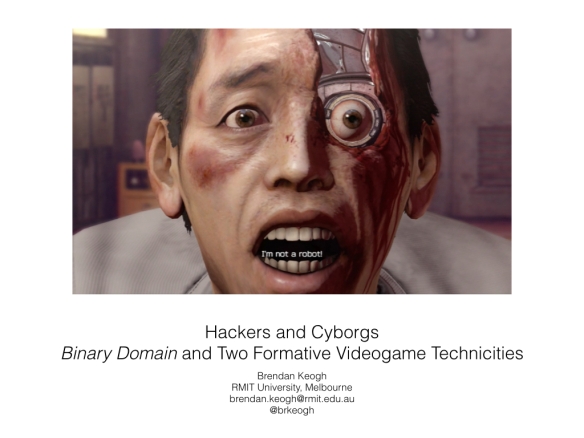


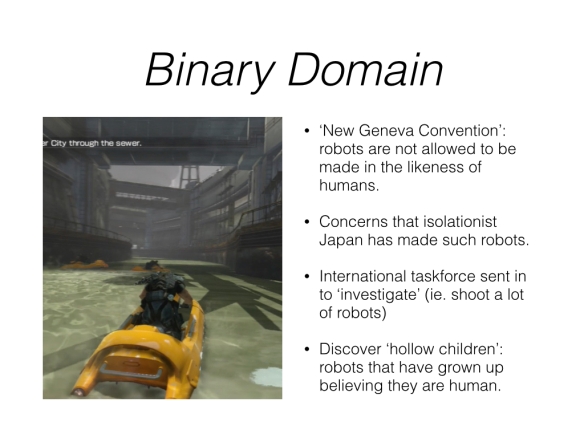
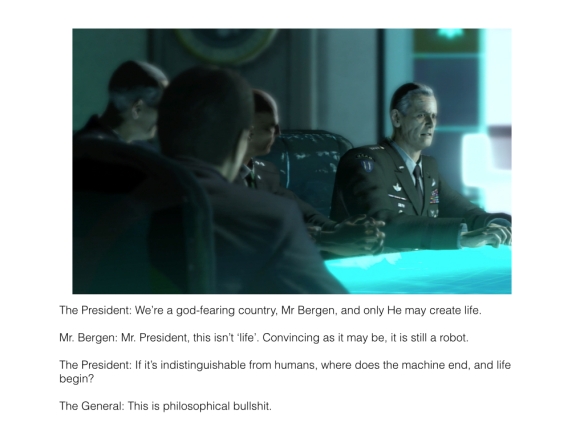

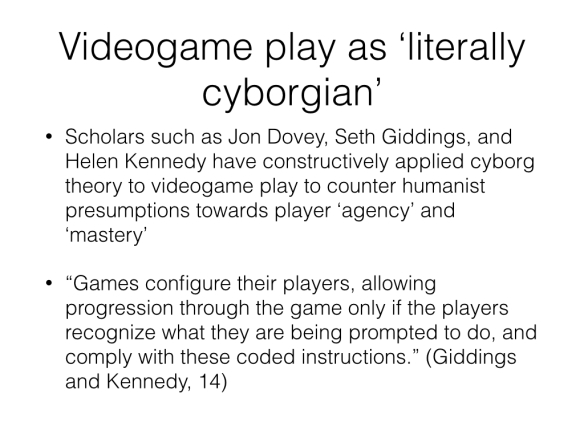
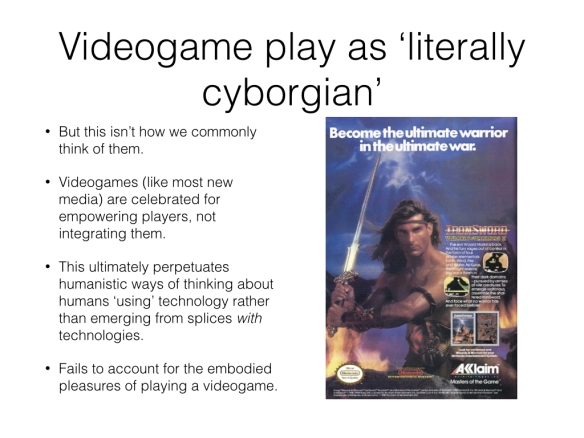
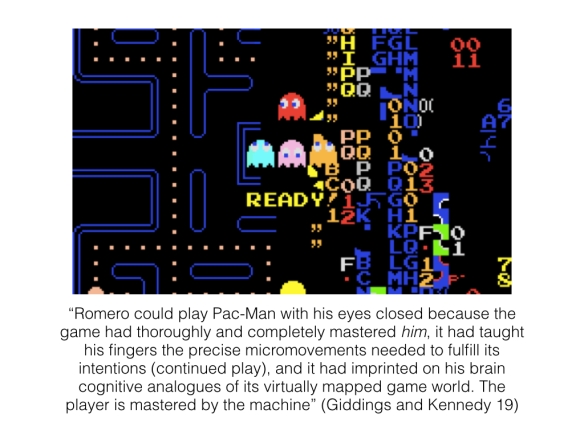

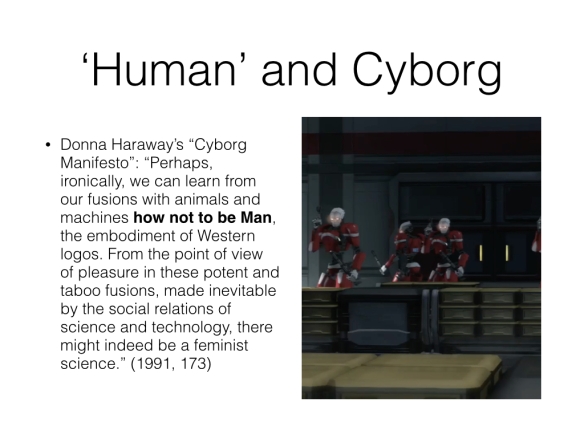
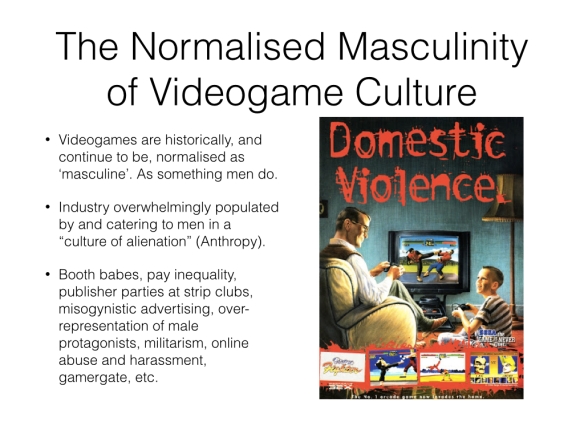

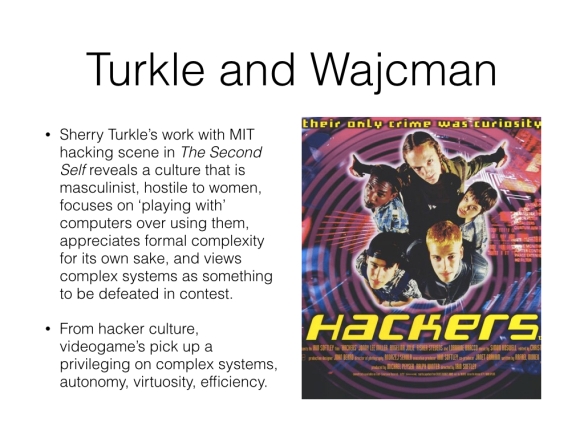
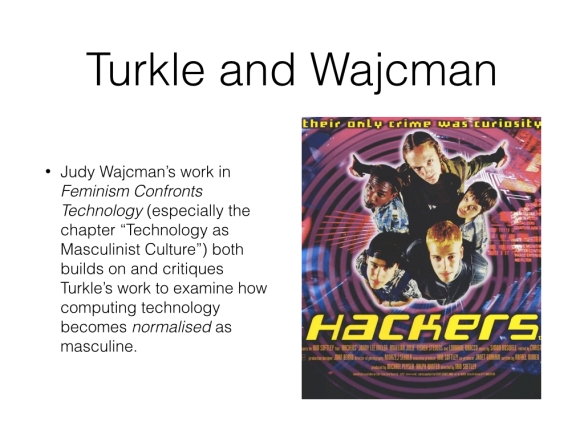


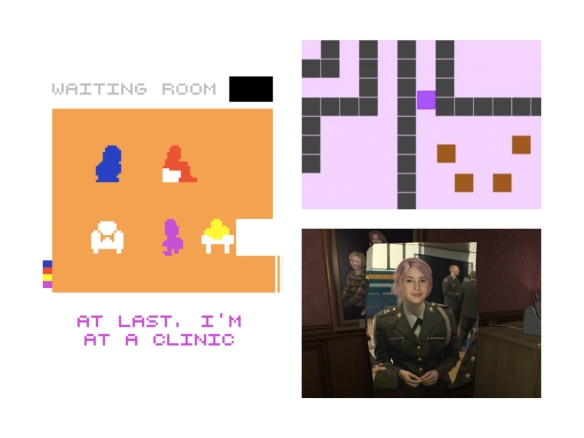








You must be logged in to post a comment.